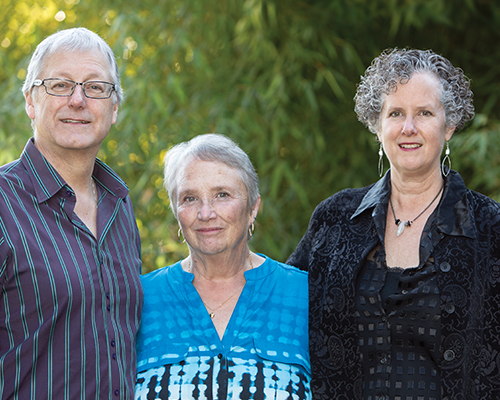Sarah, Bill and Esther
Sarah, Bill and Esther’s story is about good friends. These friends and ‘lovers of the arts’ have known each other for more than 15 years.
Sarah – who is now living with dementia – met Bill and Esther years before her diagnosis, when they all became involved in the same community choir. Sarah and Esther both sang in the choir and worked together on the production team and Bill consulted with the organization for strategic planning. They became fast friends, soon earning the nickname, “The Three Amigos.”
About seven years ago, Bill and Esther were on a trip to Thailand where they shared a large house with other adults, some of whom they knew and others they didn’t. They had such a great experience that they continued to talk about it. When they returned to Canada, they began to look for a house suitable to live in with other like-minded people. In 2014, they settled in a beautiful home in North Burnaby with two friends. Sarah was invited to move in as well, however, she wanted to continue living on her own. She came over frequently to share meals, socialize, and celebrate special occasions with her friends.
In 2016, when she realized she was having significant short-term memory issues – ultimately diagnosed as the onset of dementia – Sarah decided to move in with Bill, Esther, and their housemates. Though she initially resisted the idea, she knew she needed help to deal with her changing situation and was motivated by her deep trust and affection for both Bill and Esther. It took a short while for Sarah to get used to the idea of having other people around, but she and her cat, O’Malley, settled in comfortably.
Since being diagnosed with dementia, Sarah has found that being able to speak about her experience of the disease enhances understanding and changes how people – including her family – treat her. With Bill and Esther’s support, Sarah stays active and engaged, and continues to participate in her community by singing in two local choirs, reading stories to pre-school children, and attending movies and live theatrical, musical, dance, and social events on a regular basis.
Media

Sarah’s Tips for Dealing with Dementia:
- This is NOT the end of your life as you know it. It is the beginning of a change in the way you cope with the world and your life in it.
- It is extremely important to have people around you who know about your situation and who are able to navigate the journey with you compassionately, without being overly sympathetic or worrying.
- It is good to get out of the house fairly often…either with your spouse/partner/housemates or with a group of friends.
- Lead as normal a life as you can. You will have to make adjustments to this as the disease progresses but keep as much of your normal routine in place as possible.
- Get all the information you can about the disease and talk it over with your medical practitioners, as well as your friends and family.
- Read everything you can get your hands on, for as long as you can…from funny papers to novels—books, newspapers, magazines, any words in a row! It helps to keep your brain working.
- If you are in a meeting take notes…if you have an important conversation, take notes…if you want to remember ANYTHING, take notes!
- Exercise is really good for you, it gets the blood moving to and through your brain.
- Talk to people about what’s up for you. Do NOT isolate yourself or be ashamed of your condition.
- A Few Tips for dealing with dementia (from the point of view of caregivers):
- Treat the person with dementia as an adult person. This person is not a child and wants to be treated with respect.
- Remember, even though you may have heard the same statement/request/story/complaint/etc. MANY times, it’s usually the first time for the person with dementia. As often as you can, respond as if it is the first time you’ve heard it.
- Laugh regularly. Find ways to deliberately and consciously include humour in your lives.
- Always acknowledge and honour the feelings of the person with dementia…and then move on, responsibly and respectfully, to a distraction or another topic.
- Avoid trying to “fix” things or offer solutions to situations—so many times the person with dementia just needs to feel heard and understood.
-
More Stories
-

Cindy
2018
British Columbia
-

Hollis
2018
British Columbia
-

Myrna
2018
British Columbia
-

Naomi
2018
British Columbia

Comments
We may use your information in order to track your relationship with us and our site(s). We do NOT share your information with third parties.